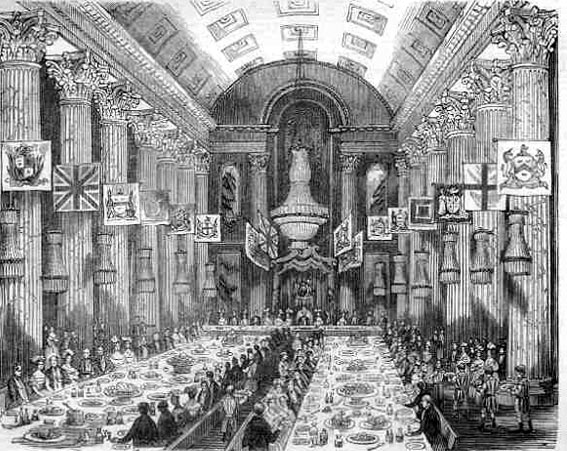
The Right Hon. the Lord Mayor, attended by his Esquires, the Sword and Mace Bearers
On the 8th of November, the multitudinous members and representatives of these venerable fraternities, each one arrayed in the garments of his tribe, assemble at a "court of hustings" to receive from the old Lord Mayor a resignation of his office, and to tender the oaths to the new one, on his acceptance of the vacant chair. The scene presents us with a model of the entire frame work of the British empire, as represented by Sovereign, Lords, Commons, and all classes of people. The wards of London send their twenty-six Aldermen and 240 Common Councilmen to gaze on the transmigration of the Lord Major. The state that surrounds the Corporation is a type of the state that surrounds the Monarchy. In the annual election of the "King of the City," we have a memorial of the time when the king of the land was elective. In the meeting of the Corporation within Guild hall, we see a shadow — and a magnificent shadow — of the time when the entire commonalty [sic] met and acted together; yes, we have a memorial of the time when the Lords occupied the upper end of the chamber of Parliament, and the Commons humbly stood below. The Aldermen are types of the Barons; the Common Council of the Commons; while in the livery-men of the companies, who have the privilege. above their brother freemen, of electing the civic functionaries, we have a type of the constituencies of Britain. We may see, too, a miniature of the judges of the land, in the attendant Recorder and Common Sergeant; while the Sheriffs, Under-Sheriffs, Town Clerk, Remembrancer, Pleaders, Secondaries, Attornies, Auditors, Wardens Clerks, Officers of the Lord Mayor's Household, City Marshals, and the host of minor functionaries, who pour in among the crowd, give the ceremony an imposing air of grandeur.

The Right Hon. the Lord Mayor's Banquet
The last hour of the Lord Mayor's reign approaches; but the Lord Mayor never dies — his spirit is immortal. Two chairs — a small and a large one — are there fore placed (see our engraving), that, in the presence of the representatives of the eighty-one existing guilds of London, the transformation may be seen, and the Corporation be proved to live for ever. But, before this important act takes place, a more important one is transacted — the Lord Mayor elect is sworn. This is a ceremony of high religious import. Low, on his knees, before a table covered with the City Charters, and other formal documents, his hands placed on the Gospels, he is devoutly pledged to "keep faith and a good conscience" in the maintenance of his state and dignity. This done, the departing Mayor exchanges seats with him; and, lo! the power of the Lord Mayor has passed from one body to another! Sword-bearer, Mace-bearer, Purse-bearer, advance with threefold obeisance, and lay their emblems of office on the table. They retire, and stand among the crowd, sunk to the level of common humanity. But the new Lord Mayor speak; it is the voice of law — it is the command of authority. Sword-bearer, Mace-bearer, Purse-bearer, advance once more; they resume their insignia of office, and start up official beings. Such is the initial act of the new Lord Mayor; "now is Mortimer lord of the city." The Ex-Lord Mayor, seated on a low chair, denuded of the collar of S, the jewels, and all the outward and visible signs of supreme power, then receives the congratulations of the company, and, after him, the new Lord Mayor, in like manner, the same.
II. — The Show — Men in Armour
The show, as arranged by the Lord Mayor and Sheriffs' Committee, is a poor one. A different result might have been expected, as the Lord Mayor belongs to the wealthy Fishmongers, and is reputed to have made a great deal of money by his civic connections. Be that as it may, the men in armour are always interesting, and they are to ride in the show. We have, therefore, by permission of the Board of Ordnance, had a series of careful sketches made of the steel suits, shields, swords, &c., which are kept in the Tower; and these we have grouped together in the way in which they are exhibited to the public in the procession. For the Man in Brass we are indebted to Mr. Marriott, of Fleet Street, in whose custody as the head and representative of the Braziers of London, he is ordinarily kept.
Note: This article accompanies "Portrait of the Right Hon. Michael Gibbs, Lord Mayor," on page 297 in the Illustrated London News for 9 November 1844.
Related Material
- Ceremony of Inducting the New Lord Mayor into His Office
- The Hon. Michael Gibbs, Lord Mayor of London, 1844
References
[Articles on the Installation of the New Lord Mayor.] The Illustrated London News (22 April 1843): 371, and (9 November 1844): 297.
Last modified 21 October 2006